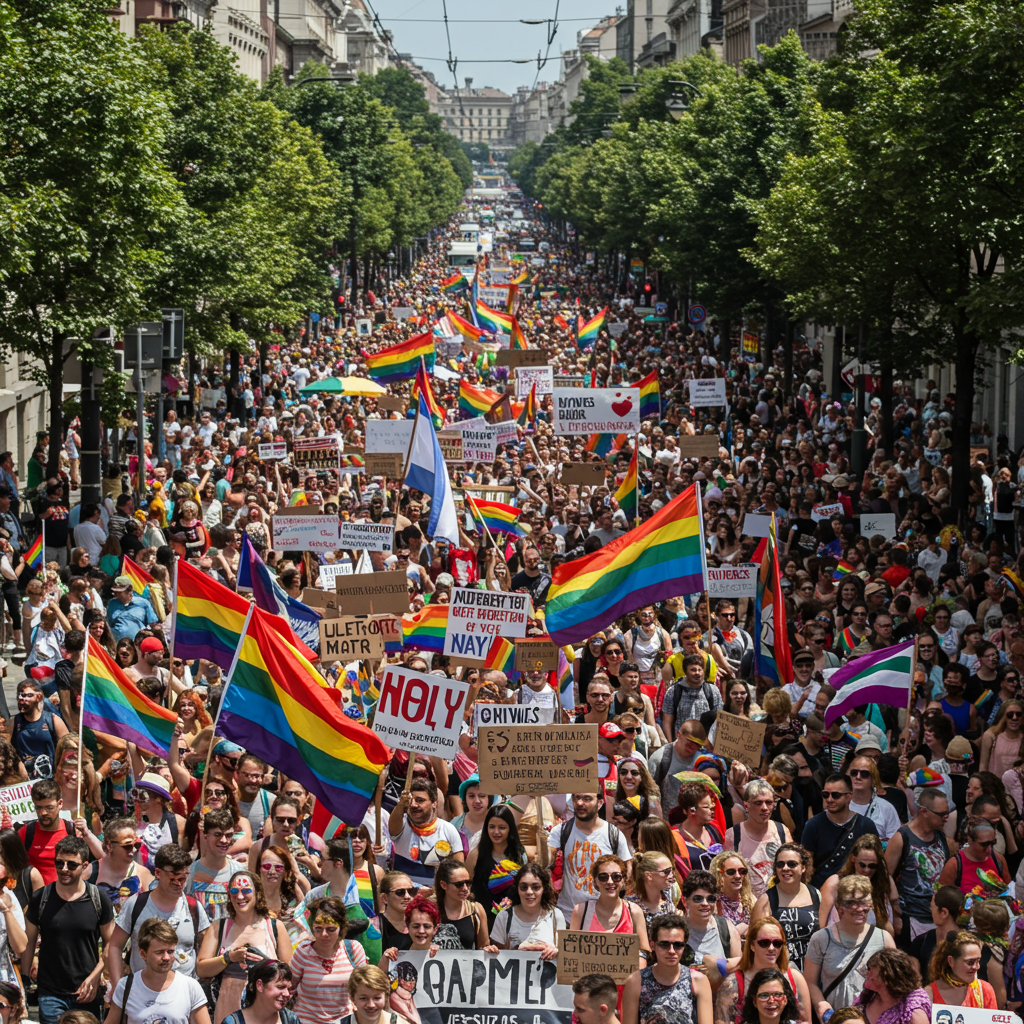The planned Budapest pride march was set to proceed on Saturday, a powerful act of defiance against explicit threats from Hungarian Prime Minister Viktor Orbán’s government. Organizers, anticipating a potentially record turnout, pressed ahead despite significant pressure from nationalist conservative politicians and a police ban aimed at preventing public displays of support for LGBTQ+ rights.
This confrontation highlights escalating tensions between Hungary’s government and civil society groups, drawing international condemnation and support. The government’s actions stem from a controversial new law, which critics argue is being weaponized to suppress fundamental freedoms.
Hungary’s Controversial ‘Child Protection’ Law
The basis for the police ban is a “child protection” law enacted by Hungary’s parliament in March. This legislation, pushed through by Orbán’s ruling Fidesz party, creates a framework police can use to prohibit public LGBTQ+ gatherings. Authorities justify this by claiming the law protects children, arguing it overrides the constitutional right to assemble freely.
Critics widely dispute this rationale. They view the law and its application as part of a broader strategy by the Orbán administration to curtail democratic freedoms and restrict LGBTQ+ visibility in Hungary. This move is seen by some as particularly relevant ahead of next year’s general election, where the ruling party faces a notable challenge from opposition groups.
Legal Risks for Participants and Organizers
Prime Minister Orbán addressed the situation publicly, advising citizens to adhere to the law and warning of “clear legal consequences” for those who did not. While downplaying the likelihood of violent clashes, he was firm about potential repercussions for attendees and organizers.
Under the interpretation of the new law and the police ban:
Attendees: Risk fines potentially reaching €500 (approximately £427 or $586).
Identification: Police are explicitly empowered to use facial recognition technology to identify individuals participating in the banned event.
- Organizers: Face significantly harsher penalties, including the possibility of a one-year prison sentence.
- www.bbc.com
- www.travelandtourworld.com
- <a href="https://www.huffpost.com/entry/hungary-pride-march-bann685e7699e4b073fdc1d56a75″>www.huffpost.com
- ca.news.yahoo.com
- www.inkl.com
Hungary’s Justice Minister specifically warned Budapest’s liberal Mayor Gergely Karácsony that organizing a prohibited event could lead to such severe consequences.
Defiance and Expected Turnout
Despite the formidable legal threats and the official police prohibition, the Budapest Pride organizers remained resolute. They expressed hope for a record attendance, signalling the strength and resilience of Hungary’s civil society in the face of government pressure.
Mayor Gergely Karácsony actively sought to circumvent the police ban. He declared his intention to organize the event as a municipal celebration of freedom, arguing that events designated by the municipality in its own public spaces are not subject to the same restrictions as traditional assemblies. However, police rejected this argument, maintaining the event fell under the scope of the child protection law and remained prohibited.
Tens of thousands of supporters from across Europe were anticipated to join the march. Participants from approximately 30 countries were expected, highlighting the international significance of the event and the broad solidarity it garners.
International and Domestic Solidarity
The situation has drawn considerable international attention and support for the LGBTQ+ community in Hungary. Prominent European figures planned to show their solidarity by attending the march. EU equalities commissioner Hadja Lahbib, a former Belgian foreign minister, was in Budapest and expected to join, alongside dozens of Members of the European Parliament (MEPs). Commissioner Lahbib posted in support, stating the march would symbolize the strength of civil society.
Prior to the event, European Commission President Ursula von der Leyen publicly urged the Hungarian government not to block the march. This call was met with a sharp rebuke from Prime Minister Orbán, who told von der Leyen to “refrain from interfering” in member states’ law enforcement affairs. Orbán even likened receiving instructions from the EU Commission to receiving orders from Moscow during the communist era, underscoring his government’s resistance to perceived external pressure on its domestic policies.
Support also came from numerous foreign governments and civil society organizations. More than 30 embassies collectively expressed their solidarity with the march. Domestically, seventy Hungarian civil society groups, including major human rights organizations, issued an open letter backing the event. They argued the law used to ban the march was specifically designed to “intimidate the entire society.”
Safety Concerns and Counter-Demonstrations
Beyond the legal risks, attendees faced significant safety concerns. Several European countries, including the United Kingdom, Belgium, France, and the Netherlands, issued travel warnings to citizens planning to attend the march. These advisories specifically mentioned potential legal risks like fines and surveillance via facial recognition, but also highlighted safety risks due to planned counter-demonstrations.
Notably, Hungarian police authorized a counter-demonstration by the far-right nationalist Our Homeland party. This group, known for its anti-LGBTQ+ rhetoric, planned to occupy bridges in central Budapest, potentially obstructing the Pride march route. This authorization of a counter-protest in close proximity raised serious concerns about the potential for clashes and violence between Pride participants and counter-demonstrators. European governments explicitly advised their citizens to maintain distance from such counter-demonstrations and follow local police instructions for safety.
Despite the authorization of counter-protests, Prime Minister Orbán maintained that Hungary is a “civilised country” and a “civic society” where people “don’t hurt each other,” even when they disagree. He suggested physical harm would not reach the level of violence seen elsewhere, implying that consequences would remain strictly legal. Critics, however, viewed the authorization of potentially confrontational counter-demonstrations as undermining this assurance and increasing risks for attendees.
Political Context and Strategy
Political analysts interpret the Hungarian government’s strong stance against the Budapest Pride march as part of a deliberate political strategy. By making the event a highly contentious issue, the ruling Fidesz party aims to regain control of the political narrative and mobilize its core conservative voter base ahead of the upcoming election.
Recent opinion polls suggest Fidesz faces a significant challenge, particularly from the rising popularity of Peter Magyar’s centre-right Tisza party. Analysts note that Fidesz has historically dictated political topics, but the emergence of Tisza, which has largely avoided taking a definitive stance on LGBTQ+ rights, has made this more difficult. By focusing on the Pride march through the lens of “child protection,” Fidesz appeals directly to its base on a culturally divisive issue.
While Peter Magyar was not expected to attend the march, the Tisza party stated that attendees deserved state protection. They called upon Hungarian authorities and police to protect citizens at the event, even if it required “standing up against the arbitrariness of power.” This suggests a nuanced political landscape where even opposition parties are navigating the sensitive issue of LGBTQ+ rights and state authority.
The situation in Budapest encapsulates the broader struggle for LGBTQ+ rights in Europe, set against national governments asserting conservative social values and challenging EU principles on fundamental rights and rule of law. The international response, including diplomatic support and travel warnings, underscores the high stakes involved and the importance of continued advocacy and visibility. As the event proceeded, participants were advised to remain cautious and well-informed due to the prevailing legal threats and potential safety risks.
Frequently Asked Questions
What is the reason for the ban on the Budapest Pride march?
Hungarian authorities banned the Budapest Pride march based on a new “child protection” law passed in March. The government claims this law restricts gatherings considered to be promoting homosexuality, arguing this is necessary to protect children and that this overrides the right to assembly. Critics view this as a tactic to suppress LGBTQ+ rights and civil liberties.
What legal consequences could march participants face?
Individuals attending the banned Budapest Pride march risk facing fines of up to €500. Police are authorized to use facial recognition technology to identify participants for potential fines. Organizers of the event face much more severe penalties, including the possibility of a one-year prison sentence, according to government warnings.
Are there safety concerns for those attending the event?
Yes, safety concerns for attendees were significant. Hungarian police authorized counter-demonstrations by a far-right nationalist group planning to obstruct the Pride march route. This raised fears of potential clashes and violence. Several European countries issued travel warnings advising their citizens about these safety risks, in addition to the legal threats.
The Budapest Pride march ultimately serves as a symbolic stand for freedom and visibility against government policies perceived as restrictive.
Word Count Check: 1190




